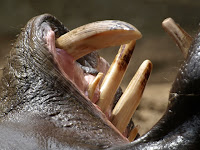Ivory is basically dentine which is the material which makes up the teeth of all mammals. From a commercial point of view, ivory can be the tusk of elephants, walrus, narwhal or the teeth of a hippopotamus. It is the elephant tusk which is the most valuable.
South African elephant tusk is smaller in size and less strong as compared to Indian elephant tusk and it is of course illegal to trade elephant tusk as prohibited by laws.
Chemical Composition:
Calcium hydroxyl phosphate with some organic matter such as collagen.
Classification / Type:
Elephant Ivory: upper incisor teeth of animal.
Hippopotamus: both the incisor and canine teeth of the hippopotamus.
Walrus: less dense, fine texture and grain.
Narwhal: the horn of the animal is the incisor tooth.
Colors / Varieties:
Creamy, white, yellow, brown.
Crystal System / Forms:
None
Hardness:
2.5, bone can go up to 3.
Specific Gravity:
Dentine Ivory: 1.70 - 2.00
Vegetable Ivory: 1.38 - 1.42
Cleavage / Fracture:
None / Fibrous.
Refractive Index / Birefringence:
1.54 / Nil
Magnification:
Elephant tusks in a transverse section show fine
striations which appear as crisscross lines in a curved manner. This
effect is described as an engine turning effect and is due to fine
canals which extend outward from the central cavity. In a longitudinal
section, parallel lines are seen.
U.V. Fluorescence:
Blue to blue-white.
Treatment (Enhancement):
Bleaching
Staining with tea water to make the ivory appear old i.e. to age ivory.
Colored impregnation (dyeing)
Specific Tests:
Ivory is not resistant to chemical action. Nitric acid and phosphoric acid softens it.
Simulants (with separation tests):
Bone: Hardness 2.5; S.G. 2.00; R.I. 1.54; surface structure will show short dark lines or dots which are the cut haversian canals.
Deer Horn: Hardness 2.5; S.G. 1.70 - 1.85; R.I. : 1.56; a similar structure to bone with less visible haversian canals.
Vegetable Ivory: This is nearly pure cellulose and is the hard
seeds of certain palm trees such as ivory palm, doom palm etc. Hardness
2.5; S.G. ± 1.40; R.I. 1.54
Plastic: mainly celluloid, smoother structure and softens to hot point.
Geological Occurrence:
Animal body.
Cuts & Uses:
Carvings, beads, bangles, ear rings, dagger handles, ivory sheets used for paintings etc.












